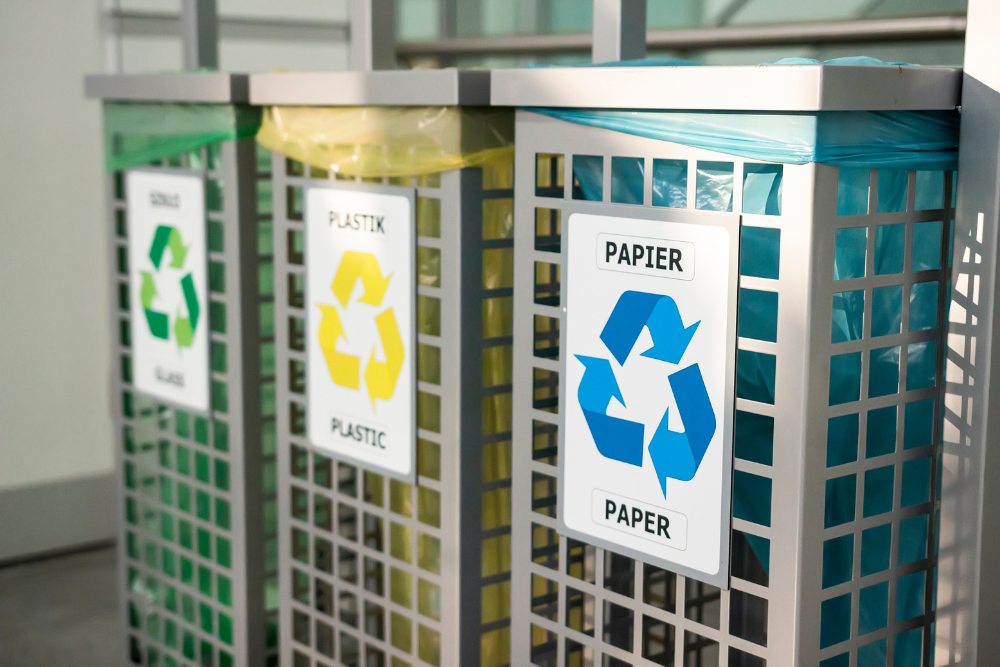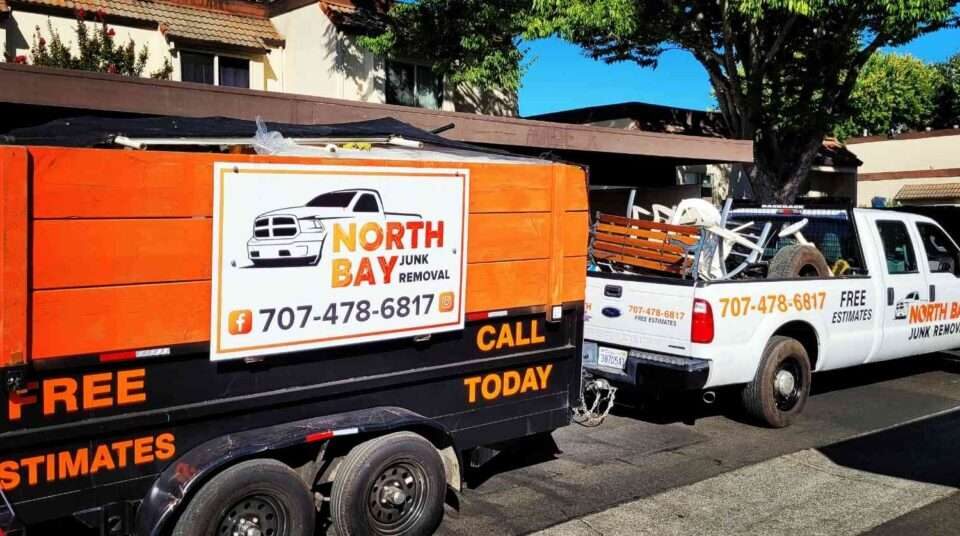
How Donation Pickup Services Help Support Local Communities
September 23, 2025
How Scrap Metal Removal Can Boost Your Eco-Friendly Efforts
September 23, 2025Why E-Waste Disposal Should Be a Top Priority for Homeowners and Businesses
Electronic devices are part of everyday life, from the phones in our pockets to the computers powering businesses. But with constant upgrades and rapid technological changes, outdated electronics quickly pile up. Improper disposal of these items has serious environmental and health consequences, as they contain harmful chemicals like lead, mercury, and cadmium. For both homeowners and businesses, managing e-waste responsibly is no longer optional—it is essential. Proper e-waste disposal helps reduce pollution, conserves valuable resources, and ensures a safer future. By making it a priority, communities can embrace sustainability while protecting both the environment and public health.
Understanding the dangers hidden in electronic waste
Electronic devices may look harmless once discarded, but inside them lies a cocktail of hazardous materials. Circuit boards, batteries, and displays often contain heavy metals that, when exposed to the environment, leach into soil and water. Lead, for example, can contaminate groundwater, while mercury disrupts aquatic ecosystems. These substances pose significant risks not just to nature but also to human health, with links to respiratory issues, neurological problems, and long-term illnesses.
When homeowners and businesses treat e-waste as ordinary trash, these dangers multiply. Landfills are not designed to contain toxic substances, and improper disposal leads to widespread contamination. Beyond the environmental toll, communities pay the price through higher healthcare costs and reduced quality of life. Understanding these hidden dangers highlights why e-waste disposal should never be ignored. Instead, prioritizing safe and eco-friendly removal ensures electronics are handled responsibly, preventing toxins from becoming silent threats to society.
The role of e waste recycling in conserving natural resources
Every electronic device contains valuable raw materials like copper, aluminum, gold, and rare earth elements. Mining these resources requires extensive energy and often leads to environmental damage, including deforestation and water pollution. Recycling e-waste reduces the demand for new mining by reclaiming these precious materials from discarded devices. This practice not only conserves natural resources but also minimizes the ecological destruction linked to extraction.
For homeowners and businesses alike, recycling is a way to keep valuable elements in circulation rather than letting them go to waste in landfills. Recovering metals from e-waste can significantly reduce the need for virgin materials, lowering energy consumption and protecting fragile ecosystems. When electronic waste is disposed of properly, it transforms from a liability into a renewable resource. Making recycling a priority strengthens resource conservation efforts and ensures that the growing demand for technology does not come at the expense of the planet.

Why businesses must take responsibility for electronic waste
Businesses often generate large volumes of e-waste, from outdated computers to obsolete office equipment. Neglecting proper disposal not only harms the environment but also exposes companies to regulatory and reputational risks. Many regions enforce strict rules on how businesses manage e-waste, and failure to comply can result in fines or legal consequences. Beyond regulations, today’s consumers expect companies to demonstrate environmental responsibility, making sustainable practices a crucial part of maintaining trust.
Proper e-waste management also benefits businesses internally. Disposing of electronics through certified channels protects sensitive data stored on devices, reducing the risk of breaches. Partnering with professional junk removal services ensures secure handling while promoting eco-friendly practices. By prioritizing responsible e-waste disposal, businesses can align with sustainability goals, enhance their public image, and safeguard sensitive information. In today’s environmentally conscious market, corporate responsibility for electronic waste is not just advisable—it is indispensable.
How homeowners can manage electronic waste effectively
For homeowners, managing e-waste often begins with awareness. Old phones, chargers, or broken laptops tend to accumulate in drawers or closets, forgotten until clutter becomes overwhelming. Instead of discarding them with regular trash, residents can set aside a designated collection area for electronics. Many municipalities offer e-waste drop-off programs or organize collection events, making disposal more accessible.
Another option is partnering with professional junk removal services that specialize in handling e-waste safely. These services ensure devices are recycled or repurposed responsibly, keeping hazardous materials out of landfills. Homeowners can also explore donation options for functioning electronics, giving them a second life with charities or schools. Managing e-waste effectively requires consistency and planning, but the impact is significant. Each effort helps reduce environmental harm while contributing to a cleaner, healthier community. By treating electronic waste as a priority, homeowners turn everyday decisions into meaningful acts of sustainability.
The environmental costs of ignoring e waste disposal
Ignoring e-waste disposal has consequences that ripple far beyond landfills. Discarded electronics release toxins that contaminate soil and groundwater, spreading pollutants through entire ecosystems. Wildlife suffers from these chemicals, and contaminated food and water sources eventually impact human populations. Beyond toxins, e-waste left unmanaged contributes to resource depletion, as valuable metals that could be recycled are instead wasted.
Climate change is another dimension of the problem. Mining and manufacturing new electronics consume vast amounts of energy, generating greenhouse gases. Without recycling, the cycle of resource extraction intensifies, further straining the planet’s climate systems. Ignoring e-waste disposal is essentially choosing short-term convenience over long-term survival. Addressing this challenge demands proactive efforts from both homeowners and businesses. Recognizing the environmental costs of neglect transforms e-waste from a hidden issue into an urgent priority that must be integrated into sustainable practices.
How professional junk removal services simplify e waste disposal
Many homeowners and businesses hesitate to handle e-waste because of the complexity involved. Devices contain a mix of recyclable materials and hazardous components, and sorting them correctly can be overwhelming. Professional junk removal services simplify this process by offering expertise and reliable systems for collection and recycling. With trained teams, they ensure e-waste is managed according to environmental standards, relieving clients of the burden.
These services also provide convenience. Instead of transporting bulky items like old televisions or office copiers to recycling facilities, professionals handle pickup and safe disposal. Businesses benefit from scheduled services that keep workspaces clutter-free while maintaining compliance with regulations. Homeowners enjoy peace of mind knowing their electronics are not harming the environment. By relying on experts, the complexities of e-waste disposal are replaced with a streamlined, eco-friendly solution that fits seamlessly into both personal and corporate sustainability goals.
The economic opportunities in recycling electronic waste
Recycling e-waste does more than protect the environment—it also fuels economic growth. The recovery of valuable materials like copper, silver, and gold generates revenue while reducing reliance on expensive mining operations. Recycling industries create jobs in collection, sorting, processing, and resale, supporting local economies. Communities that embrace e-waste recycling benefit from both cleaner environments and stronger economic activity.
For businesses, participating in recycling programs can lower costs by reducing waste disposal fees and even generating returns from recovered materials. Governments also save money by reducing the environmental cleanup costs associated with improper disposal. These economic advantages highlight the potential of e-waste recycling as both a sustainable and financially rewarding practice.
Why data security depends on proper e waste disposal
Electronics often contain sensitive personal or corporate data, even after they are no longer in use. Simply throwing away old computers or smartphones can put individuals and businesses at risk of identity theft or data breaches. Proper e-waste disposal includes secure handling of devices to ensure that data is destroyed or removed before recycling. Professional junk removal and recycling services often partner with certified facilities that guarantee safe data destruction.
For businesses, this is especially critical. Regulatory compliance often requires secure disposal of devices containing customer or employee information. Mishandling e-waste not only threatens privacy but also exposes companies to legal liabilities. Homeowners, too, must remain cautious about personal information stored on devices.
The role of awareness campaigns in promoting e waste disposal
Awareness plays a powerful role in transforming how communities approach e-waste. Many people still underestimate the environmental hazards of electronics or are unaware of local disposal programs. Awareness campaigns can bridge this gap by educating the public about safe disposal methods and the benefits of recycling. Schools, local governments, and businesses can all contribute by sharing resources and organizing collection events.
Campaigns also inspire behavioral change. When communities see their neighbors actively participating in e-waste recycling, it creates momentum and encourages widespread involvement. Clear communication about collection locations, accepted items, and the environmental impact of recycling empowers people to take action. Awareness campaigns remind both homeowners and businesses that small steps—like recycling a phone charger—add up to significant environmental progress.
Building a sustainable future through e waste management
E-waste management is not just about solving today’s problems—it is about creating a sustainable future. As technology advances, the volume of discarded electronics will only increase, making proper disposal more urgent. By embedding recycling and safe handling into everyday practices, societies can break free from harmful patterns of waste and resource depletion. Homeowners and businesses that embrace this approach contribute to a long-term vision of sustainability.
A future built on responsible e-waste management ensures cleaner air, safer water, and healthier communities. It also fosters innovation in recycling technologies and supports a circular economy where resources are continuously reused. The choice to prioritize e-waste disposal today lays the foundation for a better tomorrow.
Conclusion
E-waste disposal is more than a task—it is a responsibility that shapes the health of our environment and communities. With electronics becoming an inseparable part of modern life, the waste they generate cannot be ignored. Proper handling reduces toxins, conserves valuable resources, supports economic opportunities, and safeguards data security. Homeowners and businesses alike must embrace this priority to ensure both ecological balance and social well-being. Partnering with professionals provides a simple, effective solution for safe disposal while aligning personal and corporate practices with sustainability goals. North Bay Junk Removal in Santa Rosa, CA, offers dependable services that make this process easy and eco-conscious. With their expertise, e-waste is handled responsibly, preventing harm and promoting a greener future. To schedule reliable junk removal, call 707-478-6817 today. Every step toward responsible disposal contributes to a lasting impact, turning electronic waste from a growing problem into a sustainable opportunity.




